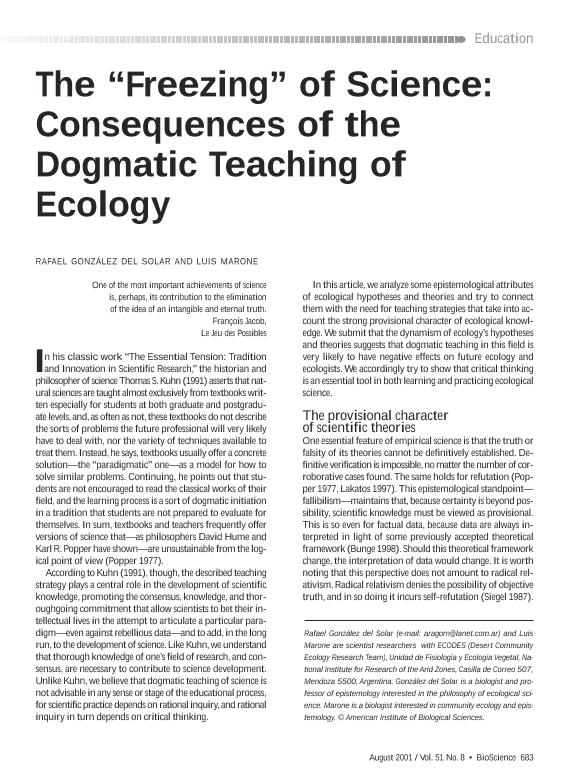Artículo
The "freezing" of science: consequences of the dogmatic teaching of ecology
Fecha de publicación:
12/2001
Editorial:
American Institute of Biological Sciences
Revista:
BioScience
ISSN:
0006-3568
Idioma:
Inglés
Tipo de recurso:
Artículo publicado
Clasificación temática:
Resumen
In his classic work “The Essential Tension: Tradition and Innovation in Scientific Research,” the historian and philosopher of science Thomas S. Kuhn (1991) asserts that natural sciences are taught almost exclusively from textbooks written especially for students at both graduate and postgraduate levels, and, as often as not, these textbooks do not describe the sorts of problems the future professional will very likely have to deal with, nor the variety of techniques available to treat them. Instead, he says, textbooks usually offer a concrete solution—the “paradigmatic” one—as a model for how to solve similar problems. Continuing, he points out that students are not encouraged to read the classical works of their field, and the learning process is a sort of dogmatic initiation in a tradition that students are not prepared to evaluate for themselves. In sum, textbooks and teachers frequently offer versions of science that—as philosophers David Hume and Karl R. Popper have shown—are unssustainable from the logical point of view (Popper 1977).
Palabras clave:
TEACHING
,
ECOLOGY
,
SCIENCE
Archivos asociados
Licencia
Identificadores
Colecciones
Articulos(IADIZA)
Articulos de INST. ARG DE INVEST. DE LAS ZONAS ARIDAS
Articulos de INST. ARG DE INVEST. DE LAS ZONAS ARIDAS
Citación
González del Solar. Rafael; Marone, Luis; The "freezing" of science: consequences of the dogmatic teaching of ecology; American Institute of Biological Sciences; BioScience; 51; 8; 12-2001; 683–686
Compartir
Altmétricas




